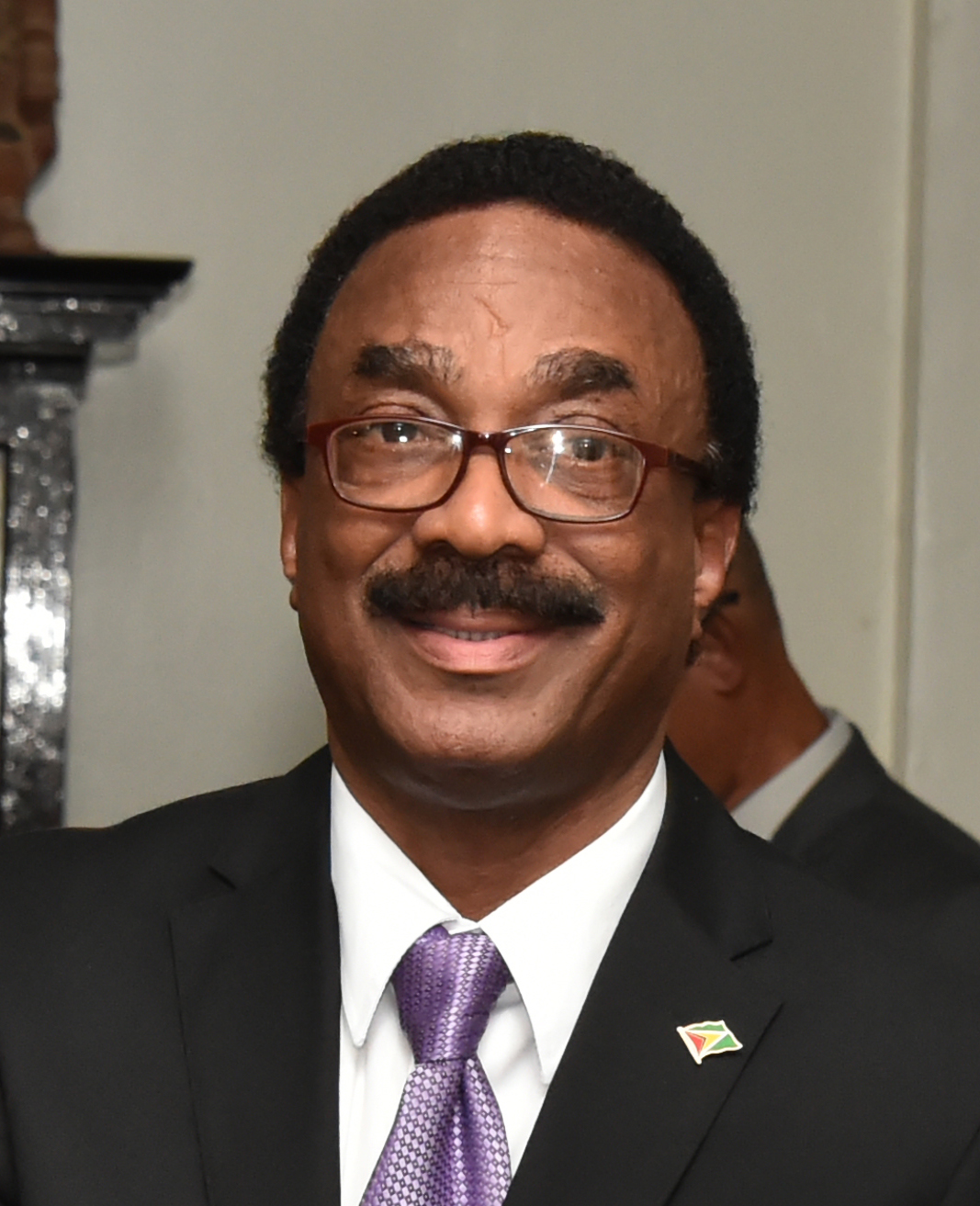Oral arguments on the validity of the no-confidence motion against government began yesterday in Guyana’s Court of Appeal, where Attorney-General (AG) Basil Williams warned of devastating consequences for the smooth running of the country if the finding that Cabinet should have resigned is allowed to stand.
Presenting oral arguments before acting Chancellor Yonette Cummings-Edwards and Justices of Appeal Dawn Gregory and Rishi Persaud yesterday, Queen’s Counsel Dr. Francis Alexis also submitted on behalf of the government that the incorrect formula had been utilised on December 21st for calculating the votes to validate the passage of the motion, which he maintained lacked the needed majority of elected parliamentarians.
In a hearing which spanned close to six hours before a packed courtroom at the Guyana Court of Appeal, Williams, Alexis and other attorneys for the state presented their various arguments which they contend invalidate the vote and for which the government could not be regarded as having fallen.

The state is appealing the January 31st judgments of Chief Justice (ag) Roxane George-Wiltshire SC that the 33 votes in favour of the motion constituted the needed majority and should have triggered the immediate resignation of the Cabinet, including the President. The judge delivered decisions on an application brought by Williams, in which Opposition Leader Bharrat Jagdeo and Speaker of the National Assembly Dr. Barton Scotland were the respondents, and on an application by attorney Christopher Ram, in which Jagdeo and Scotland are also the respondents.
The motion, which was sponsored by Jagdeo, was declared passed by Scotland following a vote in its favour by then APNU+AFC parliamentarian Charrandass Persaud on the night of December 21st.
Government had initially accepted that the motion was properly carried but later backtracked, claiming the need for an “absolute majority of 34” from the 65-member National Assembly and that Persaud’s vote was invalid given his dual citizenship.
Private citizen Compton Reid also filed a challenge to Persaud’s vote, seeking a declaration that he could not have been qualified for election as a member of the National Assembly in the first place since he had pledged allegiance to Canada, in violation of the constitution.
Justice George-Wiltshire found, however, that even though Persaud was a parliamentarian in violation of the constitution, his vote was valid.
Reid, through his attorneys Neil Boston SC and Robert Corbin, has since appealed that ruling. His matter has been set for commencement of oral arguments before the Appeal Court on March 20th.
In his presentation to the court, the AG addressed the effect of the Chief Justice’s ruling that having been defeated on the vote of no-confidence, the president and Cabinet needed to immediately resign.
This appeal is in direct response to the action brought by Ram, who sought, among other things, declarations that the motion having been lawfully passed, the President and his Cabinet should immediately resign in keeping with Article 106(6).
Williams began by pointing out that the use of the term “immediately” is nowhere used in the Article and argued that it was unlawfully implanted by the Chief Justice.
As a matter of fact, he said that Justice George-Wiltshire failed to conjunctively apply Article 106(6) with Article 106(7), which calls for a resignation until after a new president would have been sworn in.
Article 106(7) provides, “Notwithstanding its defeat, the Government shall remain in office and shall hold an election within three months, or such longer period as the National Assembly shall by resolution supported by not less than two-thirds of the votes of all the elected members of the National Assembly determine, and shall resign after the President takes the oath of office following an election.”
Williams said that so important is the role of Cabinet, Parliament and the President in the smooth functioning of a democracy, it would be injurious to have the Cabinet resign. He said that it is the latter that has to approve spending and payment of salaries, among myriad other things, that Cabinet could not be asked to resign outside the scope of Articles 106(7).
The AG said that 106(6) cannot be read in isolation to 106(7) as the former is subject to the latter, which is clearly indicated by use in the latter of the word “notwithstanding.” He added that what the Chief Justice sought to do in her ruling was to sever Cabinet from the President and government, but he said that there is a symbiotic relationship among them all.
Williams expressed the view that if the Chief Justice’s ruling were to stand for the Cabinet to resign, then there would be devastating consequences for the smooth running of the country. He further contended that the framers of the constitution could not have contemplated the extraction of Cabinet, which he said is a vital core needed for a working democracy.
Noting the concern of many over the possible expiration of the 90-day period and elections not being held, Williams said that in accordance with law, the holding of elections lies within the remit of the Guyana Elections Commission (GECOM) and not with government.
He said that the body is independent and insulated from any governmental or political party interference. He added that government always has to be guided by the readiness of GECOM for the holding of elections, even though it is the executive which would usually announce an election date.
“Government can’t hold an election. That’s an absurdity. It’s the GECOM which has to do that,” he argued.
According to him, government does not have the means to dictate to GECOM when elections are to be held.
GECOM has since said that it would not be able to hold elections within the 90-day period, citing among other things lack of funds to so do.
The three months period from the passage of the vote on the motion expires on March 21st.
Majority
Alexis, a former attorney general of Grenada and part of the battery of attorneys representing government, argued that 33 could not be regarded as the needed majority for passage of the motion in the 65-member National Assembly.
Tasked with explaining the need for the “absolute majority,” Alexis reasoned that in Guyana’s 65-member National Assembly, half would result in a fraction of 32.5. If it is to be rounded to the next whole number, that figure will be 33 and in accordance with the practice and the application of the meaning of majority, one has to be added to calculate a majority.
According to him, the majority legally required in Article 106(6) of the Constitution for a vote of no-confidence to pass needed to be 34 or more of all elected members of the National Assembly and not 33.
Against this background, Alexis contended that the Chief Justice erred and misdirected herself in law when she ruled that 33 votes constituted a majority.
Article 106 (6) of the Constitution states, “The Cabinet including the President shall resign if the Government is defeated by the vote of a majority of all the elected members of the National Assembly on a vote of confidence.”
Alexis said it is significant to note that passing a no-confidence motion does not require the “simple majority” of 33 as is needed for the passage of simple Acts, which merely require the majority of members of the House present as a quorum and voting.
He posited that issues surrounding a no-confidence motion are more democratically enshrined in the constitution and therefore it requires an absolute, instead of simple, majority for passage. He added that the framers of Article 106(6) could not have intended a mere simple majority for passage of a motion that has such a serious consequential effect as toppling a government.
As a result, he said that not only the literal form of interpretation, but also the purposive approach has to be used for interpreting the provision, which would provide a deeper understanding of the intent of the framers of the constitution.
Williams previously made these arguments as well.
No-confidence not provided for
Also presenting arguments at yesterday’s hearing was attorney Roysdale Forde for Minister of State Joseph Harmon, who was added as a party to the proceedings in the lower court, in his capacity as representative of the APNU.
Forde specifically took issue with what was considered to have been passed on December 21st, saying nowhere in the constitution is a motion of no-confidence provided for.
As a matter of fact, he said that what the Guyana constitution provides for in Article 106(6) is a “vote of confidence.”
This, he posited, is separate and distinct from a motion of “no confidence,” while adding that the issue of accountability of the executive which is required for the laying of a motion of no-confidence is not called into question in a vote of confidence.
Citing a plethora of case law, Forde said that in fact a motion of confidence has to be brought by a government and is so allowed to test its stability and, if it is defeated, then that defeat results in its dissolution.
According to Forde, what was debated in the National Assembly had nothing to do with calling the president’s exercise of power into question. He said what that was brought by Jagdeo was a motion of no-confidence in the government.
On this point, Forde submitted that what the Chief Justice would have done would have been to give effect to a no-confidence motion, which is not provided for by the constitution, and in so doing would have changed the entire construct of what is required by the local legal system with “something that doesn’t exist.”
A no-confidence motion, he argues, would specifically have had to be provided for by the constitution. The government, he posited, cannot be made subject to the will of the National Assembly.
Attorney Maxwell Edwards also presented submissions for the state and he sought to contend that Article 70(3) of the 1980 constitution guarantees to a government a full term of office for five years, which is its legitimate expectation.
That article states, “Parliament, unless sooner dissolved, shall continue for five years from the date when the assembly first meets after any dissolution and shall then stand resolved.”
According to Edwards, the Chief Justice erred in not applying the “pith and substance” of that constitution by giving credence to Articles 106(6) and (7), which were inserted after the 2000 constitution reform.
Noting that these two articles were not in the former constitution, Edwards, much to the visible surprise of the court, said that what they have essentially sought to do is subvert, dilute and water down the guarantee of a five-year term of office to a government.
Against this background, he quoted the supremacy clause of the constitution in Article 8, which says that as the supreme law of Guyana, if any other law is inconsistent with the constitution, it shall, to the extent of its inconsistency, be void.
He reasoned then that Articles 106(6) and (7) would be voided provisions as they contravene article 70(3). This latter article, he argues, has a higher level of entrenchment and requirement of a two-thirds majority for it to be changed while the former two articles do not have such a sacrosanct level of entrenchment.
Asked by the Chancellor whether Article 70(3) is not to be taken subject to Articles 106(6) and (7), Edwards responded in the negative, stating that it is the other way around.
The attorney said that in this regard, a provision with a “deeper level of entrenchment ought not to be altered by a provision with a lesser level of entrenchment.”
Hearings will continue this afternoon at 1.30, when rebuttals are expected to be made from lawyers for the respondents in the appeals.

